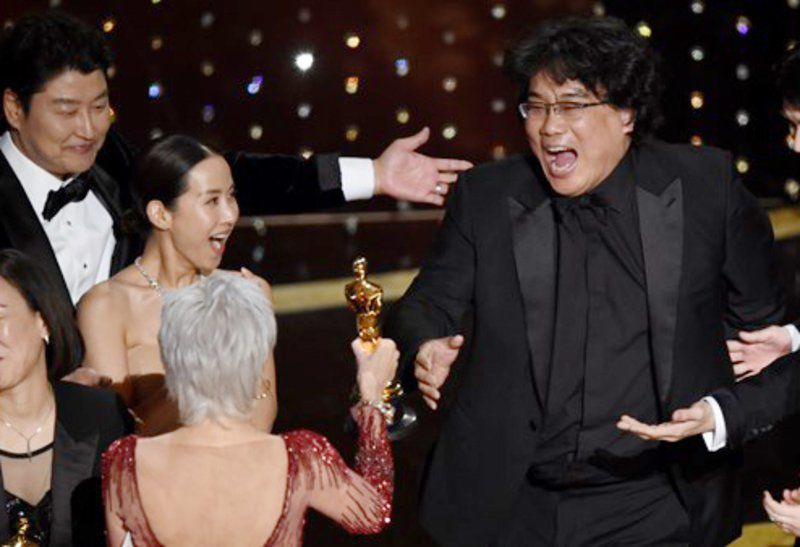I would die for Bong Joon Ho
Published 10:14 am Thursday, February 20, 2020

- Chris Pizzello | AP PhotoBong Joon Ho reacts as presenter Jane Fonda hands him an Oscar for best picture for "Parasite" on Sunday. At left are actors Song Kang-ho and Cho Yeo-jeong.
BOOOOOOOOONG!
Not everything in life works out the way you want it. Your car breaks down. You get passed over for that promotion. Deborah gets first chair oboe even though she’s constantly sharp and can’t keep an allegro pace and — ugh, she is just the worst.
Trending
And then sometimes, the universe hands you a gift. It bestows you with a surprise that elates you to no end.
For me, that was Sunday night when Parasite won best picture at the Academy Awards.
The film is Bong Jong Ho’s latest about two families in Seoul, South Korea, that become entangled with each other through a series of random and intentional events. This humble writer will not spoil anything further, but he will say that Bong eschews good guy, bad guy tropes for what life is: a mixture of gray.
Bong Joon Ho is an international treasure. Whether telling the story of one of South Korea’s biggest serial killers in Memories of Murder or making an exhilarating yet thought-provoking monster movie in The Host, Bong operates in genre much like Lebron James maestros a fast break. Both are going to dunk on you and there is nothing you can do about it.
The South Korean director has made films in his native Korean and English. Want to see Captain America (Chris Evans) fight his way to the front of a post-apocalpytic train to overthrow the ruling class? Turn on Snowpiercer. Care to view a young girl’s friendship with an genetically-altered animal (cow? pig? hippo? elephant? who knows) fight back against a massive, repulsive agribusiness giant led by Tilda Swinton and Jake Gyllenhaal? Throw on Okja.
But Parasite transcends genre. The master of genre created a story that cross cultural and language divides. Parasite is about how anyone can be corrupted by money.
Trending
Its victory is historic for a multitude of reasons, but this article will focus on the movie’s star director, Bong Joo Ho, who stole the evening.
Oscillating between Korean and English in each speech, it was impossible not fall in love with the jovial, crazy-haired auteur.
The evening felt fairly planned out at first. Parasite was the expected best foreign picture leader with a chance at best original screenplay as well. It won both.
Then, the award best director was announced and what felt like a preordained night for Sam Mendes’s 1917 shattered. Bong, not Mendes, was announced to raucous applause. Obviously not expecting the honor and out of speech material from the previous two awards, Director Bong approached the mic looking like someone who could not process the level of happiness coursing through his veins.
He started off his speech in English with a short and immediately meme-able statement, “I’m ready to drink tonight.”
Next, Bong switches back to Korean and as his translator relays his eyes, you see him cover his mouth and admire the little gold statue as he does his best to not freak out in front of millions of television watchers. It’s pure, uncut joy.
But he does not stop there. Instead of the traditional thanking of colleagues or highlighting a political subject, Bong implores those in attendance to give Martin Scorsese, who he studying vigorously in film school, a standing ovation then thanking Quinten Tarantino for helping American audiences see his films.
If anyone wasn’t part of the Bong Hive before this gracious act, those stragglers hopped aboard immediately.
The true celebration was yet to come, though.
The show ended like it always does, with the winner of best picture. 1917 was the Vegas favorite. Critics, taking the temperature of anonymous academy members, had reported for weeks that 1917 winning best picture was a forgone conclusion. Yes, critics and members of film Twitter hoped Parasite stood a chance and supporters feverishly muttered “this might be happening” after Bong won for best director.
Still, no one saw it coming.
Jane Fonda announced one word: Parasite.
It was the first time that a foreign language film won the Oscar for best picture. The first winner in the Academy’s 92 (!!!) years of existence.
Simply put, this doesn’t happen.
The audience’s reaction? Pandemonium. Take away the tuxedos and gowns and it may as well have been the crowd reaction to a buzz-beater in the NCAA tournament or a last-minute victory in the Super Bowl.
Sam Mendes could’ve done a 1917-style tracking shot following the 20-something odd Koreans who climbed on stage through crowds of Hollywood’s A-listers exalting a truly special moment.
The crowd looked like it achieved nirvana. To quote comedian John Mulaney, “it was like the liberation of France.”
When the Dolby Theatre tried to shuffle the Parasite crew off-stage by dimming the lights, the camera showed a lively Tom Hanks raising his arms with the other attendees to turn the lights back up and let more speak. They obliged, maybe out of fear of revolution.
And where was Bong? He didn’t speak, instead choosing to stand off stage-right alongside his team.
The star of the show. The star of the evening. Finally getting the international recognition he rightfully deserved and being enshrined into cinematic history.
Yet when the culmination of his entire career happened, he stood as soldier, not a leader. It takes a unique kind of unselfishness and generosity to deflect all that attention.
Besides, he just wanted a drink.





